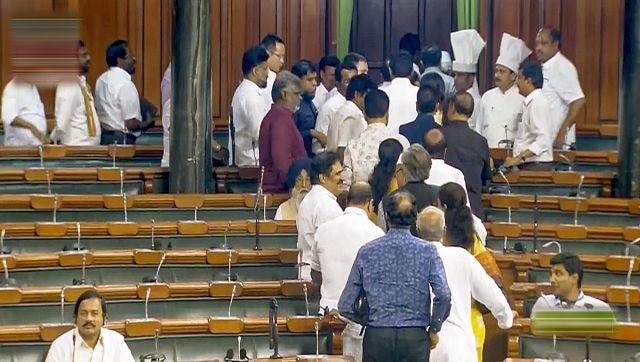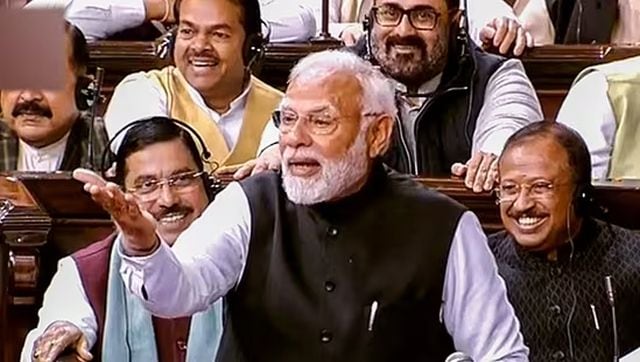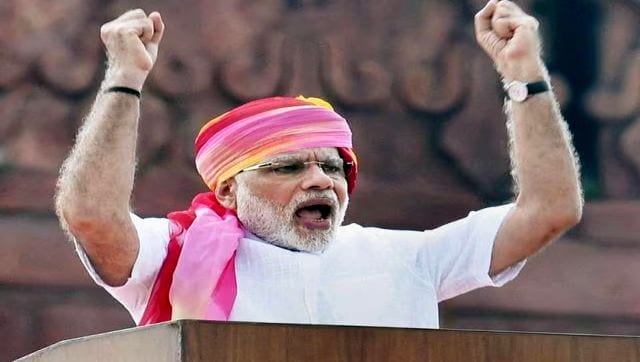The votes are in and unsurprisingly Prime Minister Narendra Modi passed the no-confidence motion against him in the Lok Sabha. While the results come as no surprise – the numbers had revealed that Modi had the support – his reply to the no-confidence motion moved against his government was the biggest news grabber on Thursday evening, with television channels and social media abuzz with it.
Wrapping up the three-day discussion, which saw several leaders such as Home Minister Amit Shah, Nirmala Sitharaman and Rahul Gandhi speak, Modi stood up in Lok Sabha on Thursday evening and delivered a strong rebuttal, hitting out at the Opposition INDIA alliance, the Congress and the Gandhi family in particular, saying “people of the country” have “no confidence” in them.
And Modi didn’t hold back. His rebuttal was one of his longest speeches, lasting for more than 130 minutes (that’s two hours and 10 minutes). Interestingly, it’s also one of the longest speeches ever made in Parliament; his minister, Amit Shah, during the no-confidence motion spoke for two hours and 13 minutes, breaking a 58-year-old record for being the longest speech ever made in Parliament.
We take a closer look at PM Modi’s lengthy speeches, and how he is able to keep his listeners captivated.
Modi’s reply to no-confidence motion (2 hours and 13 minutes)
At two hours and 13 minutes, on Thursday, Modi, perhaps, delivered his longest speech as prime minister. The speech saw high drama as members of the Opposition even staged a walkout through it. However that didn’t deter the prime minister and he not only attacked the Opposition but also set the tone for the ruling BJP’s campaign for the 2024 general election.
Speaking on the Manipur issue, Modi said: “Many families (in Manipur) are facing difficulties. Many have lost their kin, and heinous crimes have been committed against women. The Centre and state are together trying to address the situation. I want to assure the people of the country that the state will see a new dawn.
“I want to tell the people of Manipur, its women and daughters, that the country is with you, this House is with you. We will face this together and peace will again be restored there. I want to assure the people of Manipur that no stone will be left unturned to ensure that Manipur is on the path of development again.”
He added that while the High Court’s verdict granting Meiteis’ Scheduled Tribes status was the immediate trigger, it was the politics of the Congress that is the root cause of the problems plaguing Manipur and the entire north eastern region, which he described as his ‘jigar ka tukda’.
Modi also took the opportunity to take swipes at the Opposition alliance, terming them as a collection of arrogant dynasties who will take India back by two centuries. Taking on their allegation of spreading hate, the PM said: “The opposition is all about ‘loot ki dukan’ and ‘nafrat ka bazar’.
He further questioned the credibility of the Opposition and said: “To survive they had to take the support of the NDA. The Is in their name stand for the arrogance of the 26 parties and the parivar (dynasty). They stole the NDA. They broke up India with dots – I.N.D.I.A.”

Modi’s speech also enabled the PM to exude confidence on his return to power in 2024. “I thank the Opposition for bringing the motion, which appears to be ordained by God. Back in 2018, when a similar motion was brought, I had said that these no-confidence motions do not subject us, but them to floor tests. The latest motion is in a way auspicious for us and a clear indication that we will return to power in 2024 breaking all past records,” he said.
He sneered at the Opposition, saying that “when you bring another no-confidence motion in 2028”, adding that in “my third term”, India will emerge as the world’s third-largest economy.
“They (Opposition) is a guarantee of taking India back by two centuries, while Modi guarantees that in my third term I will ensure India’s entry into the bracket of top three countries,” he said, reeling off his government’s “achievements” in poverty alleviation, sanitation, water supply, defence production among others.
July 2018 no-confidence motion (91 minutes)
In the past, Modi has spoken for long periods in the Parliament, most notably during the no-confidence motion brought against him in 2018. The PM had then spoken passionately for over an hour, during which he accused the Congress of spreading negativity and being “deeply opposed” to development.
He had said: “What we saw among members of the opposition was sheer arrogance. The only thing they have to say — remove Modi. We are here because we have the blessings of 125 crore Indians. We are not here for selfish interests. We have served the nation with the mantra of ‘Sabka saath, sabka vikas’.”

This moment has been forever etched in the minds of the people as it was the time that Congress’ Rahul Gandhi had, uncharacteristically, walked over to the Treasury benches and hugged PM Modi after he was done with his speech.
PM’s thanks to the President’s address in February 2017 (90 minutes)
A year prior to the no-confidence motion, PM Modi had put his oratory skills on display when he spoke for one-and-a-half-hour while replying to the Motion of Thanks to the President’s address.
The PM used the opportunity to defend his move to scrap old Rs 500 and Rs 1000 notes, saying that the decision was taken at the right time as the economy was doing well. “When can you have an operation? When the body is healthy. The economy was doing well and thus our decision was taken at the right time,” he said. He equated the demonetisation to Swachh Bharat, a movement to clean India. “Like Swachh Bharat, the decision on demonetisation is a movement to clean India (from corruption and black money),” he said.

He also targeted the Congress, questioning them over their failure to notify benami property in the last 26 years. “In 1988 when Rajiv Gandhi was prime minister, he had more majority in both Houses than Pandit Nehru. The Congress was everywhere from panchayat to Parliament. A bill was made to tackle benami property but it was never notified. Why, all these 26 years, the bill was never notified?” he said.
The prime minister also spoke about the surgical strikes applauding the armed forces for the decisive move.
I-Day speech in 2016 (94 minutes)
In 2016, Prime Minister Narendra Modi was his eloquent best when he stood at the ramparts of the Red Fort and delivered his Independence Day speech for a whopping 94 minutes. This, in fact, is the longest I-Day speech ever made by a prime minister; in 1947, Pandit Jawaharlal Nehru had delivered a speech that lasted for 72 minutes, which was the longest ever speech from the Red Fort until 2015.
He listed the achievements of his government, blasted Pakistan for glorifying terrorists, spoke at length about eliminating social discrimination, and also took a dig at the United Progressive Alliance government for delay in decision-making.

In a significant shift in policy, he had also made a reference to the Baloch freedom struggle in his Independence Day speech, saying the people in the conflicted Pakistani state of Balochistan, as also in Gilgit and Pakistan-occupied Kashmir, had reached out to him.
Diplomats later had said the PM’s decision to raise Balochistan in his speech was “unprecedented” as India has rarely referred to the freedom movement in the state, and had consistently denied any assistance to Baloch nationalists group as alleged by Pakistan.
It was in this very speech that Modi had also announced an increase in the pension of family members of freedom fighters by 20 per cent.
Other lengthy speeches
While PM Modi does hold the record for the longest Independence Day speech as PM in India, he doesn’t hold the record for the longest political speech across the world. That honour is held by former Finance Minister VK Krishna Menon, who spoke for over seven hours explaining India’s position on Kashmir at the United Nations. This is now listed as the longest by the Guinness World Records.
The second longest speech at an international forum was delivered by Cuban leader Fidel Castro in 1960 at the UN. It lasted four hours and 29 minutes.
With inputs from agencies
from Firstpost India Latest News https://ift.tt/EcBsQuG


0 Comments